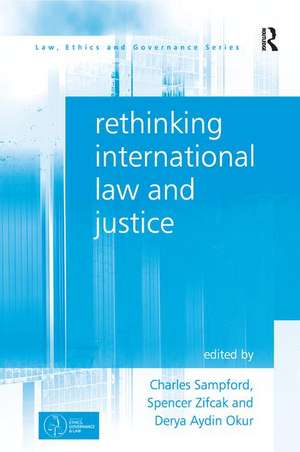Rethinking International Law and Justice
Autor Charles Sampford, Spencer Zifcaken Limba Engleză Paperback – 9 ian 2017
| Toate formatele și edițiile | Preț | Express |
|---|---|---|
| Paperback (1) | 325.43 lei 43-57 zile | |
| Taylor & Francis – 9 ian 2017 | 325.43 lei 43-57 zile | |
| Hardback (1) | 770.98 lei 43-57 zile | |
| Taylor & Francis – 28 dec 2014 | 770.98 lei 43-57 zile |
Preț: 325.43 lei
Preț vechi: 417.65 lei
-22% Nou
Puncte Express: 488
Preț estimativ în valută:
62.27€ • 65.18$ • 51.83£
62.27€ • 65.18$ • 51.83£
Carte tipărită la comandă
Livrare economică 31 martie-14 aprilie
Preluare comenzi: 021 569.72.76
Specificații
ISBN-13: 9781138637979
ISBN-10: 1138637971
Pagini: 360
Dimensiuni: 156 x 234 mm
Greutate: 0.52 kg
Ediția:1
Editura: Taylor & Francis
Colecția Routledge
Locul publicării:Oxford, United Kingdom
ISBN-10: 1138637971
Pagini: 360
Dimensiuni: 156 x 234 mm
Greutate: 0.52 kg
Ediția:1
Editura: Taylor & Francis
Colecția Routledge
Locul publicării:Oxford, United Kingdom
Notă biografică
Charles Sampford is Director of the Institute for Ethics, Governance and Law at Griffith University, Australia. His extensive list of publications includes research on jurisprudence, public law, legal education, applied ethics, corruption, corporate and professional governance, global values and institutions, environmental governance and tax policy. Spencer Zifcak is Allan Myers Professor of Law in the Faculty of Law and Business at Australian Catholic University. His principal areas of research and teaching are in public international law, comparative constitutional law, international human rights law and international organisation. Derya Aydin Okur is an Assistant Professor of International Law and the head of the Law of the Sea Section at Istanbul Kültür University, Turkey. Her teaching and research interests include public international law, law of the sea and environmental law. She has published on these and related areas in both Turkish and English.
Recenzii
’Rethinking International Law and Justice provides fresh perspectives and insights about key global problems. It reconsiders the link between International Law and justice, incorporating broader concepts such as human security and responsibility to protect with more traditional approaches. It challenges us to think more broadly and deeply about the fundamentally ethical issues which beset the globe.’ Susan Kneebone, Monash University, Australia 'A formidable collection of scholarly and philosophical essays concerning international law viewed from the perspective of both formal and substantive justice. In depth studies of specific areas of international law bring to the fore the developing focus on individual rights and global justice emerging with international law and politics.' Tom Campbell, Charles Sturt University, Australia
Cuprins
Chapter 1 Rethinking International Law and Justice, Spencer Zifcak; Part I International Humanitarian Law; Chapter 2 A Right to Fight: The Belligerent’s Privilege, Steve Nabors; Chapter 3 Justice and Protection of Civilians in Armed Conflicts through the Enforcement of the International Legal Obligations: The Case of the Gaza Strip, Davide Tundo; Chapter 4 How Effective are National Remedies in Securing International Justice?, Selman Karakul; Chapter 5 Rethinking Justice: Individual Criminal Responsibility, Immunity and Torture, Amrita Mukherjee; Chapter 6 Interpreting the Most-Favoured-Nation Clause in Investment Treaty Arbitration: Interpretation as a Process of Creating an Obligation?, Tomoko Ishikawa; Part II Non-State Actors in Promoting Justice; Chapter 7 Accountability of Multinational Corporations for Human Rights and Environmental Abuse: How Far Can Extraterritorial Jurisdiction Go?, Angelica Bonfanti; Chapter 8 The Alien Tort Statute as Access to Justice, Post Kiobel : When the International Norm Prohibiting Nonconsensual Human Experimentation is Violated, Bethany J. Spielman; Chapter 9 The Role of NGOs and Accountability of Corporations for Human Right Infringements, Genny Ngende; Chapter 10 Non-State Actors and International Climate Justice under Global Climate Governance, Saheed Alabi; Chapter 11 The Status of Non-State Actors under the International Rule of Law: A Search for Global Justice, Mohammed H. Zarei, Azar Safari; Part III Rethinking Aspects of International Justice; Chapter 12 The Responsibility to Protect at the United Nations, Spencer Zifcak; Chapter 13 Is Justice the First Virtue of International Institutions?, Charles Sampford; Chapter 14 Is it Justice or Justice(s)? The Concept of Justice in Western and Islamic Natural Law Traditions, Ahmet Ulvi Türkba?; Chapter 15 General Principles of Law and International Law-Making, Gábor Sulyok;
Descriere
This collection considers how general principles of law and underlying theories of justice from political science and international relations make a significant contribution to our understanding of the constituent elements of global justice. The book explores justice arising in specific areas of international law, including international humanitarian law, and examines the significance of non-state actors for the development of international law. The lessons derived from this research have wide implications for both developed and emerging nation-states in rethinking sensitive issues of international law and justice.
